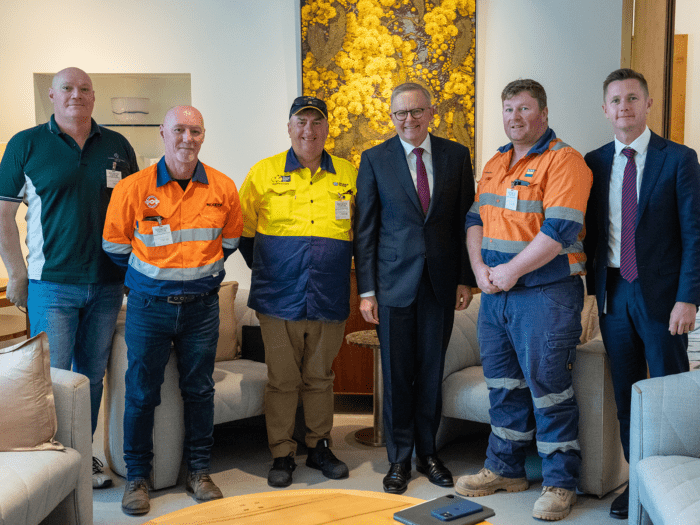AWU delegates representing workers from a range of energy-dependent industries have gone to Canberra to tell the Federal Government how the nation's energy crisis is affecting their employers and putting their jobs at risk.
Delegates included: Adam White from Queensland Alumina, which is the main electricity user in Gladstone; Andrew Bowie from Boral in Berrima (a major coal and gas user); Craig Brown from Moly-cop (a major gas and electricity user); and Harry Lumanovski of Oceania Glass (a heavy gas user).
 (Adam, Craig, Harry, Prime Minister Anthony Albanese, Andrew, and AWU National Secretary Daniel Walton)
(Adam, Craig, Harry, Prime Minister Anthony Albanese, Andrew, and AWU National Secretary Daniel Walton)
All their employers are at risk of closing if they are can't to get affordable long-term energy contracts.
AWU National Secretary Daniel Walton, who led the delegation, said he was proud to be in Canberra, meeting with the Government and showing the very real faces of manufacturing workers.
The delegates met Prime Minister Anthony Albanese, Treasurer Jim Chalmers, Resources Minister Madeleine King, Industry Minister Ed Husic and Climate Change and Energy Minister (Chris Bowen), plus key Independent MP Zoe Daniels.
"These are good workers representing industries from Victoria to Gladstone, workers making incredibly important things that keep our nation going, from our steel, cement, aluminium and glass industries," Mr Walton said.
"They are the very real faces of industries doing it tough because of extraordinarily high energy prices, not just gas but also coal."
Mr Walton said that a result of the high costs coming down the line manufacturing businesses nationwide were being forced to make sacrifices just to stay open.
"We know the forecasts for energy prices are bad, but the problem is real and it is now," he said.
"We are seeing businesses struggling to get meaningful, long-term energy contracts, and as a consequence they are going to the wall.
"Workers in the concrete and glass sectors have seen their employers' gas bills rise $20 million in 12 months; members in steelmaking have seen their employers' traditional gas price go from around $10 a gigajoule to around $33.
"And we are seeing coal companies short the supply of coal to electricity generators, which is going to lead to increases in electricity prices for households and industry."
Mr Walton said the delegation was well received, and the message was getting through to those in power, with the union pushing for an outcome by end of this year.
The main obstacle remained the big energy companies, which were not only fighting tooth and nail to protect their mega profits, but were also lobbying against the Federal Government's new IR laws.
"We need immediate action by the Government to put in place some caps on our major energy exports so businesses can prosper, not just now but into the future, providing tens of thousands of quality manufacturing jobs across the country
"But what we can see is the multinational gas companies running around saying not only don't they want to give up some of their billions of dollars in windfall profits, they are also saying workers shouldn't get a fair and decent pay rise.
"So we were down there to call them out and bring forward the very workers who work in these amazing industries so they could share their story, hopefully to get a solution once and for all to get a fair deal for Australian workers and businesses off the back of Australian resources."






